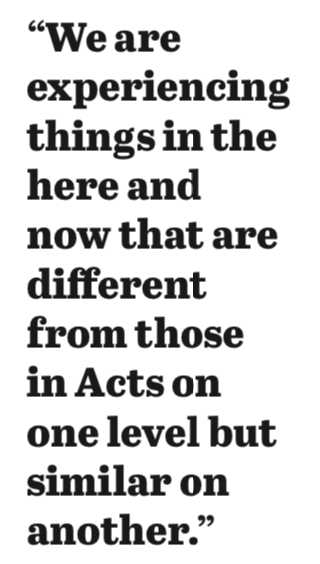By Todd J. Williams, PhD
Recently, I have been reading through the Book of Acts, reflecting on the earliest history of the church. This is something I have done a number of times over the years, beginning with my days as a student here at Cairn. The Church History I class may have been the first time in my life that I actually spent any amount of energy thinking about the start of the Christian church following Pentecost. I remember the textbooks we read, many of the lectures, and even a few of the papers I was required to write. I remember being quite taken with the hardships and the joys the early church experienced. There is drama, intrigue, inspiration, information, and background for the rest of the New Testament. There are joys, sorrows, triumphs, and losses. Familiarity with church history and the experiences of the early church is important to us because the church had a beginning, and knowing that beginning can serve us well in our own day. It can strengthen our faith, embolden us, comfort us, and give us much needed perspective for our own struggles in our own life and times.
As I’ve gotten older, it has become clear to me that this is the stuff of life; we have joys, blessings, and things that encourage us simultaneously with things that stretch us, challenge us, and often make life difficult.
I’ve also come to understand that as human beings we experience very different things in life, and sometimes we experience the same things very differently. In my most recent reading through Acts, I have been thinking about what the real life experience of the early Christians would have been like for them personally. I’ve been thinking about the strain they might have felt regarding their livelihoods in the face of persecution and ostracization, their fears about raising their children in an increasingly hostile world, and their hopes and plans to share the gospel and see others come to faith in Christ. I can imagine the complex feelings they must have experienced in watching the church grow and people be transformed by the good news while at the same time being marginalized, persecuted, and threatened. I can also imagine the strain that existed between them at times, not just because they were experiencing different things but because they were evaluating differently the things they were experiencing in common. This is part of our relationship with one another and a dynamic in Christian community that we don’t often discuss. We do not share a monolithic outlook on the events, ideas, and circumstances of our life. Taking just a minute to think about interactions you had with other believers this past year will support that assertion. We share in common core convictions, faith, and even hope for the future, but we are not homogeneous in the way we respond to, evaluate, think about, or talk about the experiences we share.
When I consider things like the stoning of Stephen, I often find myself focusing solely on Stephen’s experience and what the accepted and predominant response to it might have been amongst the early Christians. But when I’m willing to think a little deeper, it is not difficult to imagine that this event that is so pivotal in Christian history was unnerving and elicited various reactions and responses.

I have no doubt that some who witnessed it saw the passing of a martyr into the hands of a gracious Savior, while others saw it as a harsh reality of living out the gospel in a hostile world and steeled themselves accordingly. I am certain still others saw it as something they would not want to experience themselves or see their children experience. And I have no doubt, knowing human nature and human beings, that some were mortified, horrified, and terrified and saw it as the beginning of the end for the church. Of course, Acts records it for us as we are to see it on this side of history: that God’s hand was on the early church and that Stephen’s death at the hands of his persecutors advanced the purposes of God according to His perfect will in His economy and not our own. But while we live on this side of history and read the past from that perspective, we are also making history. We are experiencing life right now with all of its uncertainties and complexities. We are experiencing things in the here and now that are different from those in Acts on one level but similar on another. Life in this fallen and broken world is still life in this fallen and broken world.
There are many other events in Acts to which we could apply the same exercise.
There is the salvation of Saul, the great tormentor of the church that I am certain elicited a variety of reactions and responses, from doubt and suspicion to celebration and elation. There is the Lord killing Ananias and Sapphira for lying that no doubt created a little talk amongst the early church. There is the imprisonment of apostles, the salvation of Gentiles, the executions, exile, and church planting to the far reaches—all of which would have been viewed differently by men and women who were brothers and sisters in the Lord. And I am sure this created tension in their ranks and that gatherings often included disagreements, even arguments and divisions that were not merely about doctrinal heresies. Church leaders would have to mediate differences; facilitate reconciliation; and correct, rebuke, and exhort those who were judging and mistreating one another and dividing the church. We know this because so many epistles address these things and explicitly teach that leaders must possess the skills and willingness to carry them out. It is far too easy to think of historic events and figures as somehow free from and unencumbered by the human dynamics and personal differences we experience in our own lives in the present. But they were not. Those things were as much a part of their time as they are ours. This is the great bond that we share with history. It is not disconnected from life or from us. It is what we stand upon and is something from which we can glean and learn.
When applying an informed imagination to this history, we see the practical and honest realities without merely romanticizing the church’s past. We see the human and social dynamics that mark our own experiences. We can see ourselves in their place and them in ours. This can be helpful.

This past year (and ongoing current year), my observation of the church and the local bodies that comprise it has been that we have these dynamics at work in our midst, and they are exacerbated by an unprecedented string of circumstances and events. Of course, we have been dealing with the pandemic, social and political tensions, issues of race and racism, and economic impacts, but we have also been dealing with things like fallen Christian figures and scandals within the church and its related ministries. These things are the stuff of life in this world—the result of the fall and our broken and sinful human nature. We know that doctrinally, but practically and experientially, we evaluate and react to these things in various ways. I have witnessed and heard from many, many people about the strain of this year and how weary and worn they are from bearing up under an almost constant and increasingly complex burden. I have also heard from many that a big part of the strain and burden is navigating the disagreements that have surfaced amongst family, friends, and fellow believers. I share this experience, and it is worth reflecting upon.
We find ourselves in a variety of disagreements related to the multiple issues we have faced this past year or so. We have differences of opinion, judgments, emotional reactions, levels of concern, levels of fear, outlooks, appropriate responses, and necessary actions on every issue and event that has come our way—let alone different assessments of what God is doing. Is He moving for revival, judging us, turning us over to our own ways, preparing us for persecution, or putting in motion the eschaton? There have been sharp divides in churches over masks, singing, shutdowns, virtual worship, and approaches to compliance with government directives and guidelines. There have been differences over the threat of the virus, the danger associated with it, its origins, etc. The differences among us politically and socially are just as profound and prolific. On social and cultural issues, I have heard and experienced different reactions and responses to economic, cultural, and racial issues. We have different takes on what is going on, how we are to react, and what movements and ideas we ought to embrace or avoid. But these are not simply disagreements over “sides.” It is not simply a matter of political affiliation, or alignment with a given movement, or a position on vaccines or masks. There are sharp differences on what and who can be trusted, what is true, what is to be a priority, and even what the Bible might say. This plurality of assessments, views, reactions, and responses is difficult to manage, weighs heavy on us, and can be frustrating. But we must remember we are fallible human beings, given to our own fears and predispositions and unable to comprehend the mind of God. We must also remember who we are as Christians and how we are to live with one another. And we must strive to think and live biblically.
A proper understanding of God, ourselves, and the world in which we live is essential to navigating the human and social dynamics we, and people in every age, face.

We must be squared away regarding human nature. This enables us to always be disappointed but not surprised when we see the things we see in the world around us, in our midst, and in ourselves. In addition to this understanding, we need to glean from the early church, who, despite the fact that they experienced different things and often experienced the same things differently, came together. They came together to reason. They came together to debate and iron out differences and disagreements. They came together to chart a course forward. And they came together for prayer, fellowship, and the public reading of Scripture. This too is essential; we must remain committed to Christian community, corporate worship, and seeing ourselves as one body. We must do the hard work of exhorting, encouraging, and edifying one another. We comfort and strengthen one another. We come alongside and spur one another on. And above all else, what strikes me in Acts is the Christocentric gospel orientation that guided early Christians; kept them focused; and enabled them to not only interpret events, circumstances, and ideas rightly but also to eliminate possible meaningless division and peripheral issues.
Life in this world is not easy. We were never promised it would be, only that we would never be alone. We have one another, the indwelling Holy Spirit, and a Lord and Savior who said He would never leave us or forsake us. That sustained and guided the early church; so too it can us.
Dr. Todd J. Williams has been the president of Cairn University since January 2008. He served on the faculty and administration from 1996 to 2001, and then returned as provost in 2005. He can be reached by emailing president @cairn.edu